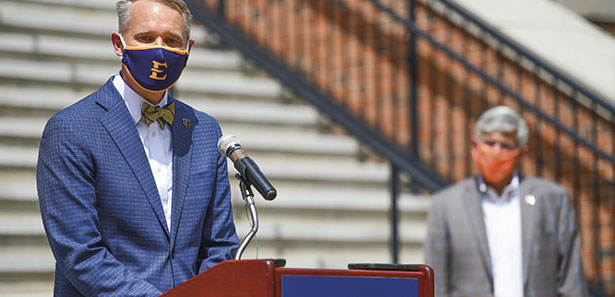Above: Alan Levine listens as Dr. Brian Noland addresses the media. Photo courtesy ETSU
Community partners support effort to research and combat adverse childhood experiences
Ballad Health and East Tennessee State University announced June 26 a new partnership that will establish a first-of-its-kind institute to promote the awareness and empirical study of adverse childhood experiences, otherwise known as ACEs.
ACEs are considered traumatic experiences, such as abuse, neglect and family dysfunction that can disrupt the safe, stable and nurturing environments that children need to succeed and thrive. ACEs can have lasting effects on children as they mature into adults, leading to adulthood disease, disability and social impediments. Studies have found the more adverse events a person experiences as a child, the higher the risk of that person having health, social and economic problems.
The Strong BRAIN (Building Resilience through ACEs-Informed Networking) Institute will facilitate the development and dissemination of evidence-based practices that prevent, reduce or mitigate the negative effects of ACEs on health and health disparities. The institute will also work to inform the citizenry and workforce in the Appalachian Highlands on the importance of being trauma informed.

“Some groundbreaking work on the study of ACEs is already being done right here in the Appalachian Highlands, and we hope the creation of this institute will make our region the national hub for future study of the effects of adverse childhood experiences,” Ballad Health Chairman and Chief Executive Officer Alan Levine said.
Levine gave a step-by-step explanation of the economic impact of ACEs and the importance to the region of combatting their effects. “If you think about it, before COVID, we had 45,000 or so people above what the average should have been for people that are out of the workforce. The workforce participation rate here was only 52 percent. How do you fix that? We know – science tells us an 18-year-old who graduates college- or career-ready is more likely to be able to sustain a family and have a healthier lifestyle. We also know – science also tells us that 18-year-olds who could not read at grade level by the third grade are much less likely to graduate high school college- or career-ready. We also know – the science tells us that kids who don’t make it to kindergarten kindergarten-ready are less likely to be able to read at the third-grade level by third grade.”
“From pre-birth to three years old, you have the opportunity to transform an entire cohort of young people so that by the time they get to 18, they’re college- and career-ready,” Levine said. “If Tennessee wants to grow economically, it’s got to have a workforce. In order to have a workforce, you’ve got to graduate your kids college- or career-ready. That’s the role Ballad and ETSU are playing here. If we do this right, the real results won’t be felt for probably another 18 years. These interventions we do at the front end, we’ll know in five years if kids are more prepared for kindergarten. Then three years after that, we’ll know if they’re better prepared to read at the third-grade level. But you have to start somewhere, and that’s where we are right now.”
Established through a five-year gift from Ballad Health to ETSU, the Strong BRAIN Institute will be guided by an advisory board comprised of ETSU experts, Ballad Health experts and community members. “We cannot thank Ballad Health enough for once again stepping up to offer this gift that will not only bring additional national recognition to ETSU, but this institute will truly benefit the people of this region, both directly and indirectly,” ETSU President Dr. Brian Noland said. “When Ballad Health and ETSU came together to form the Strong BRAIN Institute, one of our main strategic objectives was to ensure this research center serves as a resource regionally, nationally and even internationally on the study of adverse childhood experiences and the social determinants it can have on health.”
The Strong BRAIN Institute’s objectives include:
• Developing a certificate program and other educational programs to promote trauma awareness;
• Developing a plan for transforming ETSU policies, procedures, and philosophies to better align with promoting resilience and ACEs mitigation;
• Consulting with other community agencies for transforming their policies, procedures, and philosophies to better align with promoting resilience and ACEs mitigation;
• Promoting, coordinating, conducting, and spotlighting ACEs-related research and service collaborations;
• Promoting, coordinating, and spotlighting ACEs-related collaborations with multiple community sectors, such as those focused on healthcare delivery, education, business innovation, and faith-based initiatives;
• Providing infrastructural support for ACEs-related grant applications and grants management; and
• Providing consultation on ACEs-related topics throughout the community and beyond.
The Strong BRAIN institute will be designed to translate best practices of addressing adverse childhood experiences into community action though local organizations, such as the STRONG Accountable Care Community, Speedway Children’s Charities and the Niswonger Foundation.
“In addition to producing innovative research, this institute will surely attract the attention of the whole medical community who specializes in adverse childhood experiences, and hopefully, it will lead many of them to visit the Appalachian Highlands and see all that it has to offer,” Levine said.




